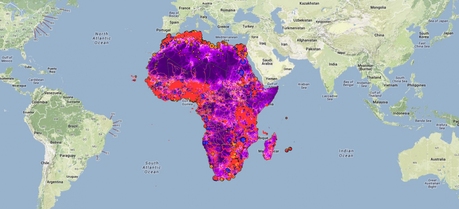 JRC-created RE2nAF tool allows the comparison of several scenarios (different diesel and PV module prices), modelling the least cost electricity option for each case.
JRC-created RE2nAF tool allows the comparison of several scenarios (different diesel and PV module prices), modelling the least cost electricity option for each case.The Joint Research Center (JRC), the EU in-house scientific service, has developed an online tool to support national governments in deciding which energy options would better accommodate their needs for off-grid, rural electrification.
The tool enables geographically-based exploratory analysis for off-grid electricity production options in Africa. It overlays the latest diesel and photovoltaic panels costs, population features (settlements), infrastructure (transmission electricity grids, roads), and national boundaries to map the current lowest-cost electricity option for rural electrification.
The RE2nAF (Renewable Energy for Rural Electrification in Africa) tool includes information on:
- Settlements: more than 6 700, with estimated population data for 2010
- Electricity grid: more than 230 000 km in 46 countries
- Power plants: more than 900 in 54 countries
- Global irradiation data
- Diesel based electricity cost: for 2008, 2010 and 2012
- PV based electricity cost: estimated for 8 module prices (from 0.75 to 2.5€/Wp)
This tool is part of the broader involvement of the JRC in renewable energy in Africa. Contributing to achieving the objectives of the Sustainable Energy for All initiative, the JRC promotes the use of renewable energy technologies in the continent through several research projects under the EU Energy Initiative and the Africa-EU Energy Partnership. JRC activities focus on providing high quality resource information, developing technical and socio-economic criteria for assessing rural electrification projects, and developing a web-based network of renewable energy research centers under the African Renewable Energy Technology Platform.
Last December we reported that a research paper by the Joint Research Center (JRC) seems to confirm that the solution to the Africa’s energy problems lies with renewable energy sources.

